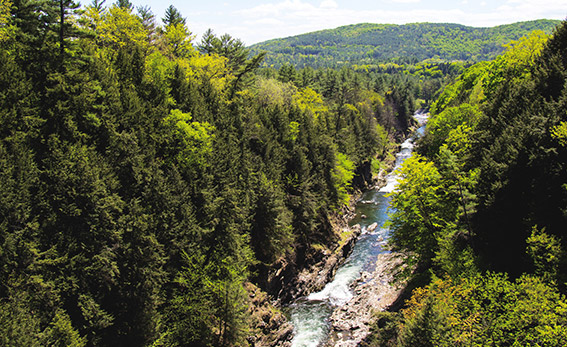Banks, credit card companies, insurers and many other businesses ask us to go paperless to help save the environment. Going paperless may seem like the best way to preserve forests, but working forests are among the healthiest forests. Responsibly managed forests contribute to healthy ecosystems, support local communities, and provide fiber to make products that advance the circular economy. Using fiber-based products is a sustainable choice.
Consider The Facts:
Trees Are A Renewable Resource.
Slogans such as "go paperless - save trees" create the impression that trees are a finite resource and that forests are being depleted. In fact, trees are a renewable resource and working forestland that is sustainably managed can continue to grow new trees again and again, while continuing to provide benefits for the planet.
- Thanks to responsible forest management, there are 20% more trees in the U.S. today than there were in 1970.1
- European forests have grown by 44,000 square kilometers in just a decade.2
Responsibly Managed Working Forests Are Good For Local Communities.
Demand for wood fiber from forest products industries leads to a need for responsibly grown trees, which in turn encourages landowners to keep their land forested - rather than converting it for other non-forest uses. Both harvested and regrown forests provide habitat for many species of plants and animals. They also provide benefits for people such as hunting and recreation.
- 36% of U.S. forests are privately owned3
- Private forestlands provide 91% of all domestic forest products in the U.S.4
- 2.5 million U.S. jobs supported by working forests5
Around the world, there are forests that are threatened by conversion to other uses, usually agricultural and animal farming. Such conversions deteriorate ecosystems. But thanks to deliberate stewardship, there are many regions where forests are thriving. Companies that manufacture forest products can be a powerful force for preventing deforestation and keeping forests healthy. Learn more about how International Paper is working to manage, conserve and restore forests in The Future of Forests.
What is a responsibly managed forest?
Responsibly managed forests fulfill economic and social functions while maintaining biodiversity, productivity and regeneration capacity.

Responsibly Managed Working Forests Are Good For The Environment.
A forest is one of nature's most powerful systems to capture carbon dioxide and mitigate climate change, purify water, and foster diverse plant and animal habitats. Forests play one of the largest roles in storing carbon dioxide in the world:
- 77% of carbon stored in vegetation exists within forests7
- 39% of carbon stored in soil occurs underneath the forest cover8
- More than 1,000 species reside in every square kilometer of forestland9
Learn more about how forests capture C02 and how International Paper plays a role in environmental stewardship here.
Fiber-Based Products Are Some Of The Most Recovered And Recycled In The World.
Because fiber-based products are made from natural materials, they can be easily recycled. Since the 1970s, recycling methods and culture have advanced to the point that, by 2020, 66% of paper and 89% of corrugated boxes in the U.S. were recycled. In Europe, 83.6% of paper and board was recycled.10
International Paper uses five million tons of recycled fiber from paper and cardboard each year, making us one of the two largest users of recovered fiber. We recover two types of fiber: pre-consumer fiber, which gets recycled before it enters the consumer waste stream, and post-consumer fiber, which comes from grocery stores, other retail outlets, and offices and homes.
Purchasing International Paper products supports forestry projects such as Forestland Stewards, our collaboration with the National Fish and Wildlife Foundation that restores and preserves forests and endangered wildlife habitats.
Fiber-Based Products Are Part Of The Circular Economy.
Recycling is just one part of the larger circularity landscape. The concept of the circular economy is based on three principles:
- Design out waste and pollution
- Keep products and materials in use
- Regenerate natural systems12
Our process is circular by nature, from the sourcing and regrowth of our primary raw material - trees - to our use and beneficial reuse of byproducts in the manufacturing process and finally the recovery and reuse of our products. This circularity is core to our industry and our existence. Learn more in Recycling and Beyond.
Imagine A World Without Fiber-Based Products.
We depend on fiber-based products every day. Boxes protect goods in transit and enable worldwide commerce, and pulp products like diapers and other personal hygiene products promote health and wellness.
Key Takeaway
You can be certain that all International Paper products are sourced from responsibly managed forests. We take extra measures to ensure that we are good stewards of the environment. By purchasing paper products from responsible companies, you are helping to ensure forestland remains forested.
Sources
Additional Resources
Downloads, fact sheets, reports and more.
FAQs
Answers to frequently asked questions about forestry, paper, packaging and pulp
Should I Go Paperless?
There may be good reasons to go paperless, but saving trees isn’t one of them
Learn MoreWhat Is Third-Party Certification?
Understanding sustainability labels when shopping for paper products
Learn MoreAre Recycled Paper Products Always Better for the Planet?
Recycling is only part of the sustainability equation
Learn More